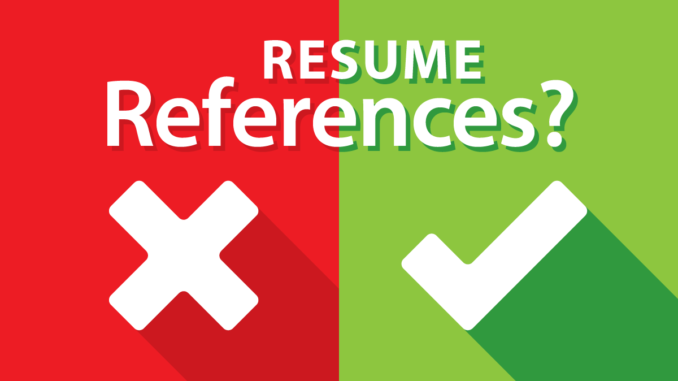
Should a candidate put references on their resume? Ten experts weigh in.
To help you decide whether or not to include references on your resume, we asked HR specialists, recruiting professionals, and business leaders this question for their insights. From giving yourself time to notify your references, to adding references for entry-level jobs, there are several things to consider as you update your resume for success in a job search.
Here are ten differing opinions when it comes to putting references on your resume:
1. Save Space and Don’t Add References
Every hiring manager and recruiter is aware that you will provide references if the organization requests them during the application process. Because your resume is a sales pitch to (ideally) start a dialogue about your past and the company’s position, every line is extremely valuable. Use the extra lines (or inches) you would have dedicated to professional references to provide additional information about yourself or to better space out your existing resume.
Nick Santora, Curricula
2. Simply Put: No References
In a way, putting down references on a resume is a waste of space that can be used in a much more effective way. Instead, this “real estate” should be used to bolster other key sections of your resume. It comes down to two simple concepts: First of all, if you get far enough in the recruitment process (sooner than later), HR will always ask you for them. Secondly, it’s implicitly understood that you are willing to provide them since that’s an obligatory part of the recruitment process.
Peter Bryla, ResumeLab
3. Give Yourself Time to Notify Your References
Having a number of resume references from previous employers who can attest to your credentials and expertise is a good idea. However, unless specifically required, you shouldn’t publish the list on your resume because you want to know when your references will be contacted. By excluding your references from your CV, the hiring manager will need to contact you to inform you that they wish to contact them. That way, you’ll have enough time to notify your references, advising them to expect a call and offering any additional information about the experience you’d like them to provide. But, as with anything else, there are always exceptions. For example, When you have a well-known figure or expert as a reference, it can make your CV stand out.
Henry Babicheknko, Stomadent
4. Adding References Is Mostly Useless
References on a resume are about as useful as instructions on a shampoo bottle. The people you pick skew positive by design. It’s like your mom reviewing your school play. On the off chance a reviewer isn’t predisposed to gush, our litigious society has all but guaranteed that they provide only the benign. Include references if you long for the expected, the monotonous, the mundane. If not, skip them.
Tim Toterhi, Plotline Leadership
5. Use a References Upon Request Statement
Unless specifically asked in the job application or listed as a requirement, do not add references in the resume or job application. Simply stating that references can be furnished upon request should be enough. If needed, the interviewer might convey it during the interaction. The biggest reason is that it is best to provide the most relevant reference — someone who can testify to the presence of the most required hard or soft skill in you. This might require you to change the reference as per the application. Furthermore, if you permanently add a reference from your last job or college on your resume, with time, their significance may reduce. It might be best to select the reference as per the job. Finally, don’t forget to ask permission before quoting someone as your reference.
Joe Flanagan, VelvetJobs
6. Help Provide Employers Peace of Mind
A candidate should definitely put references on a resume. A job applicant could magnify their accomplishments. By having people refer to the candidate, the employer gets the peace of mind that the candidate was truthful about their qualifications. Also, references can give testimonials as to the character of the job applicant. You want to make sure the new employee is easy to get along with, since they will need to collaborate with more senior employees and take orders from their superiors. By asking for references, you get assurances about the honesty and character of the job applicant.
Janice Wald, Mostly Blogging Academy
7. It Depends on the Employer
In most cases, references are not necessary at the initial stages of a job application process. If things go well and the candidate moves through the interview process, it is generally assumed that the prospective employer can and will ask for references. To that end, make sure you have a document that is prepared and ready to share, instead of scrambling at the last minute to find decent references. However, in some cases, having a well-known-in-the-industry (or well-known-to-the-interviewer) and highly relevant reference can be the difference between whether your resume is reviewed or discarded. Use your best judgment.
David Wiacek, The Career Fixer
8. Strike References from Your Resume
A candidate should not include references on their resume. Your resume should be a list of the positions you’ve held, your previous employers, your education, and your professional skills and accomplishments. Employers do not need your references until after you are offered a position. Reference checking is included in the background screening process and should not be conducted until a candidate has received a contingent job offer. Candidates should also leave off the dreaded “references available upon request.”
Annette Harris, Harris Financial Coaching
9. Include References, as Long as You Inform Them
Having references on your resume is never a bad thing, so long as you’ve informed the people in question. Almost all hiring teams cross-check the candidate’s references and get in touch with them. So if you’ve listed your previous employer without them expecting it, it doesn’t give a great impression when your reference is caught off-guard or put on the spot.
Riley Beam, Douglas R. Beam, P.A.
10. Add References for Entry-Level Jobs
If your CV is a bit thin, then yes, definitely include one to three references for consideration. However, if you’ve got a bit of experience and employment history, don’t waste resume space on references — we’d much rather see details about your roles, and follow up with references if needed!
Sylvia Kang, Mira
How JobsInTheUS Can Help
Our network of state-specific job sites help job seekers find real, local, quality jobs where they want to work — including full-time, part-time, remote and seasonal positions. Search for local jobs by keywords, location radius, company, or industry from any of our state sites, including JobsInME, JobsInNH, JobsInVT, JobsInMA, JobsInRI, JobsInCT, and more.
Many of our verified local employers also search our resume database to find potential candidates before posting positions. Log in and update your resume now and save it to your JobsInTheUS account to stand out from other job seekers.

